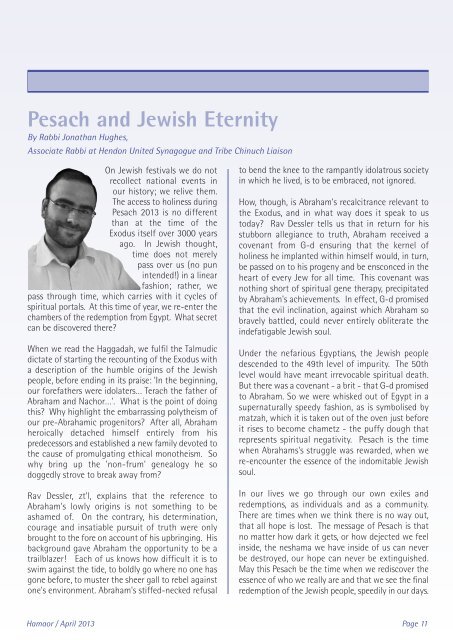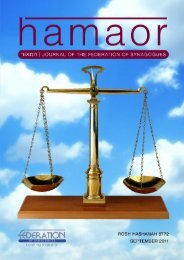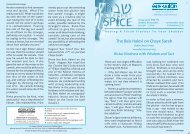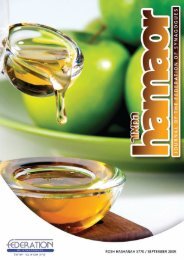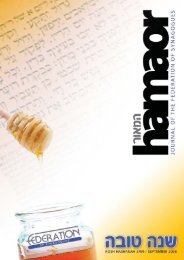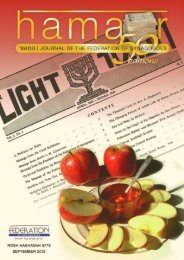Pesach 5773 - 18/03/2013 - Federation Of Synagogues
Pesach 5773 - 18/03/2013 - Federation Of Synagogues
Pesach 5773 - 18/03/2013 - Federation Of Synagogues
Create successful ePaper yourself
Turn your PDF publications into a flip-book with our unique Google optimized e-Paper software.
<strong>Pesach</strong> and Jewish Eternity<br />
By Rabbi Jonathan Hughes,<br />
Associate Rabbi at Hendon United Synagogue and Tribe Chinuch Liaison<br />
On Jewish festivals we do not<br />
recollect national events in<br />
our history; we relive them.<br />
The access to holiness during<br />
<strong>Pesach</strong> <strong>2013</strong> is no different<br />
than at the time of the<br />
Exodus itself over 3000 years<br />
ago. In Jewish thought,<br />
time does not merely<br />
pass over us (no pun<br />
intended!) in a linear<br />
fashion; rather, we<br />
pass through time, which carries with it cycles of<br />
spiritual portals. At this time of year, we re-enter the<br />
chambers of the redemption from Egypt. What secret<br />
can be discovered there?<br />
When we read the Haggadah, we fulfil the Talmudic<br />
dictate of starting the recounting of the Exodus with<br />
a description of the humble origins of the Jewish<br />
people, before ending in its praise: 'In the beginning,<br />
our forefathers were idolaters… Terach the father of<br />
Abraham and Nachor…'. What is the point of doing<br />
this? Why highlight the embarrassing polytheism of<br />
our pre-Abrahamic progenitors? After all, Abraham<br />
heroically detached himself entirely from his<br />
predecessors and established a new family devoted to<br />
the cause of promulgating ethical monotheism. So<br />
why bring up the 'non-frum' genealogy he so<br />
doggedly strove to break away from?<br />
Rav Dessler, zt'l, explains that the reference to<br />
Abraham's lowly origins is not something to be<br />
ashamed of. On the contrary, his determination,<br />
courage and insatiable pursuit of truth were only<br />
brought to the fore on account of his upbringing. His<br />
background gave Abraham the opportunity to be a<br />
trailblazer! Each of us knows how difficult it is to<br />
swim against the tide, to boldly go where no one has<br />
gone before, to muster the sheer gall to rebel against<br />
one's environment. Abraham's stiffed-necked refusal<br />
to bend the knee to the rampantly idolatrous society<br />
in which he lived, is to be embraced, not ignored.<br />
How, though, is Abraham's recalcitrance relevant to<br />
the Exodus, and in what way does it speak to us<br />
today? Rav Dessler tells us that in return for his<br />
stubborn allegiance to truth, Abraham received a<br />
covenant from G-d ensuring that the kernel of<br />
holiness he implanted within himself would, in turn,<br />
be passed on to his progeny and be ensconced in the<br />
heart of every Jew for all time. This covenant was<br />
nothing short of spiritual gene therapy, precipitated<br />
by Abraham's achievements. In effect, G-d promised<br />
that the evil inclination, against which Abraham so<br />
bravely battled, could never entirely obliterate the<br />
indefatigable Jewish soul.<br />
Under the nefarious Egyptians, the Jewish people<br />
descended to the 49th level of impurity. The 50th<br />
level would have meant irrevocable spiritual death.<br />
But there was a covenant - a brit - that G-d promised<br />
to Abraham. So we were whisked out of Egypt in a<br />
supernaturally speedy fashion, as is symbolised by<br />
matzah, which it is taken out of the oven just before<br />
it rises to become chametz - the puffy dough that<br />
represents spiritual negativity. <strong>Pesach</strong> is the time<br />
when Abrahams's struggle was rewarded, when we<br />
re-encounter the essence of the indomitable Jewish<br />
soul.<br />
In our lives we go through our own exiles and<br />
redemptions, as individuals and as a community.<br />
There are times when we think there is no way out,<br />
that all hope is lost. The message of <strong>Pesach</strong> is that<br />
no matter how dark it gets, or how dejected we feel<br />
inside, the neshama we have inside of us can never<br />
be destroyed, our hope can never be extinguished.<br />
May this <strong>Pesach</strong> be the time when we rediscover the<br />
essence of who we really are and that we see the final<br />
redemption of the Jewish people, speedily in our days.<br />
Hamaor / April <strong>2013</strong><br />
Page 11


